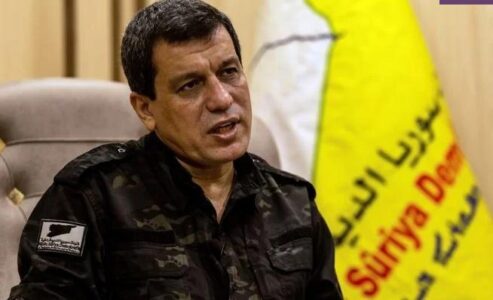
Syrian Kurds warn Washington against any Turkish ground operation
Commander of the Syrian Democratic Forces Mazloum Abdi has told reporters that his troops have halted operations against Daesh following Turkiye’s aerial attacks on northern Syria over the past week.
Four Turkish soldiers were killed on Saturday during Turkiye’s anti-terror operation in northern Iraq to clear the area of terrorists.
Amid signs that Ankara is now preparing for a ground offensive with the help of Turkiye-backed opposition fighters, Abdi’s statement from the US-backed Kurdish forces is considered a message to Washington to put pressure on Turkiye to prevent any military move in the region.
At a time when the US is attempting to assess its relations with its NATO ally and its Kurdish partners in Syria, Turkiye’s recent air attacks have drawn some criticism from Washington regarding their close proximity to adjacent coalition bases where US soldiers are stationed.
Ankara blames Syrian offshoots of the outlawed Kurdistan Workers’ Party for the deadly Nov. 13 bombing in Istanbul’s Istiklal Street that killed six Turkish citizens and injured more than 80.
Turkiye considers the SDF and its leading Kurdish group, the People’s Protection Units, as terror groups due to their links with the PKK.
Soner Cagaptay, of the Washington Institute, believes that the US will not oppose Ankara as it has done in the past.
He told Arab News: “The importance of Syria is fast retreating for the US government in favor of Ukraine, and the relative significance of the YPG is diminishing.
“Turkiye’s support for the Ukraine militarily against the Russian invasion, and Ankara’s critical position as a broker for the grain corridor deal, have also added to their value for the US in the strategic picture.”
According to Cagaptay, Turkiye has also used its leverage in the wake of supporting Swedish and Finnish bids to join NATO.
He added: “NATO’s allies have voiced support for Turkiye and did not criticize their arguments against the YPG.”
Samuel Ramani, an associate fellow at the Royal United Services Institute, says “the Syrian Kurds are using the threat of a Daesh resurgence as a pressure tactic on the US to convince Turkiye to de-escalate the situation.”
He told Arab News: “This is very similar to what unfolded during the 2019 Operation Peace Spring offensive in which former US President Donald Trump was heavily criticized for green-lighting Turkiye’s offensive and allowing Daesh to experience a potential recovery.”
The SDF’s strategy is unlikely to work, according to Ramani, and he says it is difficult to see Washington now facing the same kind of blowback as Trump received in 2019.
He said that Turkiye “has emerged as a critical mediator in the Ukraine war and the US has refrained from sanctions against the country over the continued use of S-400 systems for this reason.”
He added: “If it is not objecting to the procurement of Russian military technology, the US certainly will not crack down very hard on Turkiye over an escalation in northern Syria or Iraq.
“SDF officials have admitted their concern that the US will not do enough, and perceive the US as being disengaged from the Syrian conflict overall.”
SDF’s Abdi said that Turkish airstrikes over the past week had damaged the region’s infrastructure.
He added: “The forces that work symbolically with the international coalition in the fight against Daesh are now targets for the Turkish state and therefore (military) operations have stopped.”
Cagaptay believes that the SDF and YPG were once important partners for the US in beating Daesh, which is now defeated.
The SDF, which is the key US partner in combating Daesh in Syria, has also warned about the importance of retaining intact the security of the Al-Hol camp, which is home to Daesh family members, while the Kurdish authorities operate several detention facilities in northeastern Syria that host thousands of opposition fighters.
Cagaptay said: “YPG’s main role is now reduced to prison-keeper of the locations holding relatives of the extremists, mostly Iraqi and Syrians, that no Western country wants to take back.”
SDF’s comments came at the time of fresh reports that bases hosting US-led coalition forces in the northeastern Syrian town of Shaddadeh had been targeted by two rockets. The attacks were believed to have been perpetrated by militias backed by Iran.
In a short statement on Wednesday, US Central Command announced that American troops were put at risk, but no service members were injured in the strike.
Turkiye’s Defense Minister Hulusi Akar said on Friday that his forces would never harm coalition forces or civilians, after being questioned over allegations that warplanes hit targets near a US base in northern Syria.
Akar also held a meeting on Saturday with Chief of Turkish General Staff Yasar Guler and authorities from Turkish Land Forces Command in Ankara.
Cagaptay said: “Diminishing the security of the camps as a retaliation for Turkiye’s airstrikes will only end US support to the YPG and reduce the significance of the Syrian Kurds in the eyes of US policymakers.”
Turkiye has continued airstrikes — using fighter jets and drones — against Kurdish rebels in northern Iraq and Syria to remove militants from the border.
Experts believe that SDF statements will not alter Turkiye’s plans to pursue a potential ground operation, the fourth of its kind since 2016, in the west of the Euphrates River in the coming weeks.
Ankara and Moscow agreed in 2019 to pull YPG forces back 30 km to the south of the Turkish border.
President Recep Tayyip Erdogan said on Saturday that Turkiye “is determined to make its borders safe against terrorism.”
He added: “Hopefully, with these operations, we show our determination to gradually make every inch of our country safe, starting from beyond the border.”
Source: Arabnews





